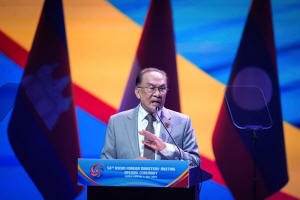Malaysian PM warns Southeast Asia that trade war is not a ‘passing
storm’
[July 09, 2025] By
EILEEN NG
KUALA LUMPUR, Malaysia (AP) — Malaysian Prime Minister Anwar Ibrahim
warned Wednesday that global trade is being weaponized as Southeast
Asia’s foreign ministers held annual talks ahead of the looming threat
of U.S. trade tariffs.
Concerns about U.S. tariffs have jolted the Association of Southeast
Asian Nations, a 10-member bloc that includes some of the world’s most
trade-dependent economies.
Six ASEAN members are among the 14 countries that could see duties on
their exports to the U.S. skyrocket on Aug. 1.
Launching the group's foreign ministers’ meeting, Anwar said the world
is now witnessing an era where “power unsettles principle” and “tools
once used to generate growth are now wielded to pressure, isolate and
contain.”
Without mentioning the U.S. by name, he again urged ASEAN to work
together to respond to trade threats.
“Our cohesion must not end at declarations,” he said, calling for
members to increase intra-ASEAN trade, invest in regional integration,
and reduce strategic dependencies on external powers. “This is no
passing storm," he said. "It is the new weather of our time.”
Trump first announced tariffs in April, but then delayed them for 90
days to allow for deals to be negotiated. On Tuesday, he announced new
tariffs with rates of between 25%-40% on 14 countries, which will go
into effect Aug. 1 unless new deals are struck. He also threatened to
increase tariffs if any countries retaliate.
Many ASEAN members have launched bilateral talks with the U.S., but
officials have said they plan to hold an ASEAN-U.S. summit later this
year to seek a common position.

So far, only Vietnam has secured a deal, bringing down its tariffs from
46% to 20%.
The list threatens 36% tariffs for Thailand and Cambodia, 32% for
Indonesia, 25% for Malaysia, and 40% for Laos and war-torn Myanmar.
Reacting to the economic headwinds, Malaysia's central bank on Wednesday
cut its benchmark interest rate for the first time in five years.
Separately, Trade Minister Zafrul Aziz said Malaysia will continue
tariff talks with the U.S. but won't compromise on issues impacting
national interest and sovereignty. He referred to U.S. requests on
policy and laws in areas such as government procurement, halal
certification, medical standards and digital tax, without giving
details.
[to top of second column] |

Malaysia's Prime Minister Anwar Ibrahim delivers his keynote address
during the opening ceremony of the Association of Southeast Asian
Nations (ASEAN) Foreign Ministers' meeting and related meetings at
the Convention Centre in Kuala Lumpur, Malaysia, Wednesday, July 9,
2025. (AP Photo/Vincent Thian)
 “It has to be fair ... if the deal
does not benefit Malaysia, we should not have a deal,” he said.
In addition to confronting trade fallout, the bloc faces mounting
internal challenges including the ongoing civil war in Myanmar and a
border dispute between Thailand and Cambodia.
The gathering in Malaysia will be immediately followed by a series
of critical meetings with ASEAN’s major trade partners, including
the U.S., China, Japan, Russia, India, and the European Union,
scheduled for Thursday and Friday.
U.S. Secretary of State Marco Rubio, who last week cancelled trips
to Japan and South Korea, will arrive Thursday for the talks on his
first visit to Asia. Others visiting foreign ministers include
China’s Wang Yi and Sergei Lavrov of Russia.
Analysts said these talks will test ASEAN’s ability to assert its
voice amid escalating geopolitical tensions.
The bloc hopes to reinforce its commitment to a rules-based trade
order while resisting pressure to align exclusively with any one
global power.
"ASEAN must be among those who choose to stand for rules, even when
others choose retreat,” Anwar said. Officials said the premier will
meet Rubio to discuss the tariff issue.
Analysts said Rubio's presence signaled renewed U.S. engagement in
the region.
It will be a reminder to "the region that Washington remains its
most vital economic and security partner,” said Collins Chong Yew
Keat, a foreign affairs, strategy and security analyst with
Universiti Malay. But he said that U.S. support may now come with
clearer expectations.
“Trump’s administration, while still offering the strongest military
deterrence and market access, expects ASEAN to stop exploiting this
security umbrella while cozying up economically to China,” he said.
All contents © copyright 2025 Associated Press. All rights reserved |